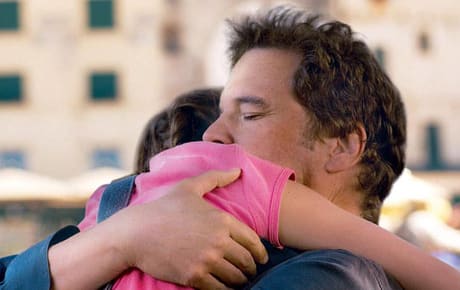Even though Michael Winterbottom tends to hop between genres, experimenting with different styles and narrative formats, there tends to be a consistency in the underlying melancholic tone in his work ― even in his comedy ― that's reliant on human disparity and dysfunctional modes of connection. It works towards the basic assertion of auteur theory, which suggests that a filmmaker essentially remakes the same film repeatedly in an effort to perfect their ideologue, which, I would argue, Winterbottom has already done with The Claim. A Summer in Genoa comes close to achieving these same heights; it's a deeply personal film about being unable to reach out and connect at the times in life when we need to most. It falls into the "deceptively simple" category, following a father (Colin Firth) and his two daughters, Mary (Perla Haney-Jardine) and Kelly (Willa Holland), on an extended trip to Genova, where he's taken a job as a visiting professor at the local university after his wife (Hope Davis) dies in a car accident. Said accident sets the stage for the film's structure, which starts out calmly, with a mother and two daughters joking around on a car trip, with the editing and shot composition become increasingly erratic, leading up to the crash. Every sequence throughout Genova follows this format, often centring on the younger Mary, who blames herself for her mother's death, walking through Italian neighbourhoods slightly behind her older teenage sister, only to fall farther and farther behind until we get the impression that she may be lost or harmed. It works twofold, with Mary feeling lost and abandoned, waking up nightly, screaming for her mother, while Kelly similarly blames her younger sister, prioritizing fleeting validation from the many boys willing to give her temporary attention. Grieving in his own way, their father has no idea how to comfort his daughters, instead finding flattery in flirtation from one of his students while long-time friend Barbara (Catherine Keener) tries her best to be an ersatz maternal figure for his grieving daughters. The overwhelming sense of impending tragedy gives this treatise on the day-to-day of grieving a quiet thriller sensibility, even though very little actually happens. This is a story told mostly through shot composition and editing, with unspoken reaction shots from the actors filling in the emotional blanks. Perhaps this is why it has taken three years for this film to make it to DVD, never finding any sort of theatrical release despite being a wholly effective, deeply thoughtful work. Included with the DVD are a series of interviews with the cast and director discussing the themes and characterization in a far more intimate manner than most American studio supplemental features.
(eOne)A Summer in Genoa
Michael Winterbottom

BY Robert BellPublished Apr 8, 2011